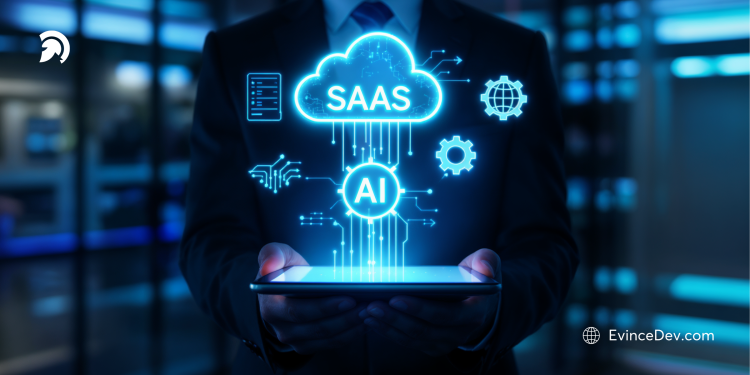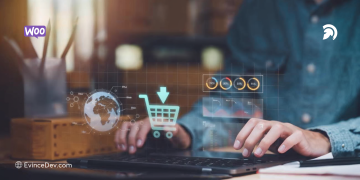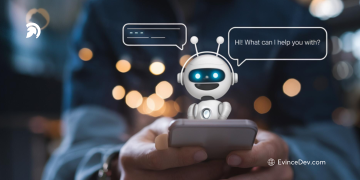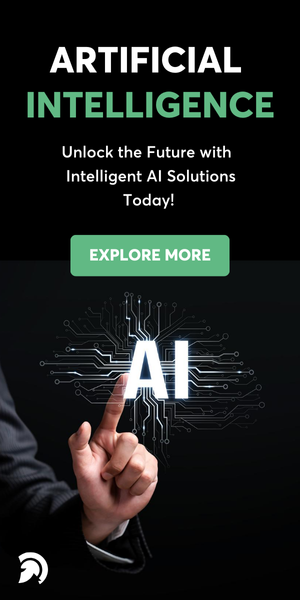Key Takeaways:
- AI and ML now power the core of SaaS platforms by delivering personalization predictive insights automation and adaptive experiences
- AI driven development accelerates SaaS delivery through automated coding testing onboarding processes and operational optimization
- Intelligent SaaS features like conversational AI predictive maintenance anomaly detection and workflow automation boost performance
- AI first SaaS requires strong data foundations with real time pipelines vector databases multi tenant models and reliable MLOps
- Generative AI and AI agents reshape SaaS UX by enabling conversational interfaces adaptive layouts and autonomous digital workflows
The SaaS ecosystem is undergoing a significant transformation. What was once defined by availability, scalability, and subscription-based delivery is now being reshaped by artificial intelligence (AI) and machine learning (ML).
These technologies are no longer optional enhancements; they are becoming the foundation upon which modern SaaS platforms are built. From hyper-personalized experiences and predictive insights to autonomous workflows, AI and ML are enabling software to become smarter, faster, and dramatically more adaptive.
As organizations demand more intuitive tools and as competition intensifies, the platforms that successfully integrate intelligence will lead the next wave of innovation.
This blog explores how AI and ML are redefining SaaS today, what the next frontier looks like, and what builders must do to stay ahead in the Future of SaaS.
What Is the Role of AI/ML in the Evolution of SaaS?
For years, SaaS platforms focused on delivering consistent functionality and simple interfaces. But modern users expect more; they expect software that anticipates needs, reduces manual work, and adapts in real time. This is where AI and ML Integration in SaaS Applications becomes essential.
SaaS is transitioning from tool-driven to intelligence-driven, enabling:
- Personalized product experiences
- Predictive insights
- Autonomous decision-making
- Adaptive workflows
This shift is increasingly visible among modern AI SaaS companies that build intelligence at the core of their products, not as supplementary features. As more organizations rely on AI and ML Services for SaaS, the evolution toward intelligent platforms will only accelerate.
Quick Stat:
According to recent industry data, 52% of SaaS companies now rely on AI-powered predictive analytics to improve decision-making. This adoption highlights how essential intelligence has become in shaping user experiences, retention strategies, and product roadmaps.
Transforming SaaS Into Brainpower: Smart, Predictive, and Context-Aware Products
-
Personalization at Scale:
AI allows SaaS products to adjust interfaces, recommend features, and tailor workflows based on user behavior. These experiences improve engagement and make AI-based SaaS solutions stand out.
-
Predictive Intelligence for Decision-Making:
Predictive analytics is now a core differentiator for machine learning SaaS products, enabling forecasting of churn, usage patterns, sales opportunities, resource needs, and performance gaps.
-
Rise of Agentic and Autonomous Capabilities:
Agent-based intelligence enhances SaaS platforms by endowing them with autonomous capabilities that can execute tasks, coordinate workflows, and improve outcomes without constant human oversight. Modern AI SaaS products increasingly rely on these intelligent agents.
Accelerating SaaS Performance: Faster Development, Smarter Delivery
AI doesn’t just make SaaS products smarter; it transforms how they are built, delivered, and scaled. By automating routine tasks, optimizing workflows, and enhancing decision-making, AI accelerates every stage of the SaaS lifecycle.
- Accelerated Product Development Cycles: AI speeds up prototyping, coding, QA, and release cycles, making SaaS Development more agile. Organizations using AI Development Services gain a measurable competitive advantage.
- Streamlined Onboarding & User Adoption: AI-driven onboarding adapts to user needs in real time, reducing friction and boosting activation rates.
- Operational Efficiency at Scale: Intelligent automation reduces operational overhead, supports forecasting, and optimizes backend performance. Many companies now use AI and ML Services for SaaS to enhance scalability and reliability.
Real-World Use Cases of AI in SaaS
AI in SaaS is not just a concept; it’s already powering mission-critical workflows across industries. Below are practical use cases that demonstrate how deeply AI is transforming modern SaaS platforms.
-
AI-Powered Onboarding Assistants:
Virtual onboarding assistants guide new users through setup, highlight relevant features, and adapt workflows based on user behavior. This personalized approach dramatically reduces time-to-value and improves activation rates.
-
Intelligent Workflow Automation:
AI can take over repetitive or routine tasks, triggering multi-step processes automatically and ensuring smooth execution with minimal human intervention. This increases efficiency and reduces operational bottlenecks.
-
Predictive Maintenance for B2B SaaS:
By analyzing product usage patterns, AI can anticipate performance issues, identify feature friction, and flag potential failures before they impact users, helping teams resolve problems proactively.
-
Conversational AI Support Systems:
AI-powered chatbots handle common queries, provide real-time troubleshooting, and route complex cases to human agents. This reduces support load and delivers faster, more scalable customer service.
-
AI-Driven Fraud & Anomaly Detection:
ML systems detect unusual patterns such as unauthorized access, payment fraud, or sudden spikes in activity. These capabilities help SaaS companies maintain security, trust, and compliance.
-
Automated Billing & Financial Operations:
AI streamlines financial workflows by automating invoicing, payment reconciliation, forecasting, and revenue recognition. This reduces manual effort and improves financial accuracy and reporting.
Quick Stat:
According to the Gitnux report, 70% of SaaS companies now integrate AI into their products, underscoring AI’s growing importance in shaping product experiences, automation capabilities, and differentiation.
Architectural Considerations for AI-Driven SaaS Platforms
Building an AI-enabled SaaS platform requires architectural choices that support speed, scalability, and continuous learning.
- Data Pipelines: Ingestion → Processing → Model Serving: SaaS products require clean, structured, and real-time data pipelines to enable accurate ML predictions.
- Multi-Tenant ML Architectures: This involves designing models that serve multiple customers securely and efficiently, while maintaining isolation and personalization.
- Real-Time vs Batch Inference: Choosing between real-time predictions and batch processing depends on the product context and performance needs.
- Embedding Vector Databases: Vector databases allow semantic search, recommendation engines, and conversational intelligence to perform at scale.
- MLOps for Continuous Delivery: Automated pipelines for training, testing, deploying, and monitoring ML models ensure ongoing accuracy and performance.
- Model Monitoring & Drift Detection: Models degrade over time; monitoring for drift ensures predictions remain accurate and trustworthy.
Data Strategy for AI-First SaaS Products
For SaaS platforms embracing AI, data is the most valuable asset and the foundation of every intelligent capability. Adopting an AI-first approach requires not just strong models but a well-defined data strategy that ensures accuracy, reliability, and long-term scalability.
-
Types of Data SaaS Apps Should Collect:
AI-powered SaaS platforms rely on diverse data types, including behavioral data, usage logs, interaction patterns, feature adoption metrics, support conversations, and real-time operational data. The richer the dataset, the more accurate and context-aware the AI becomes.
-
Data Labeling & Enrichment:
High-quality labels are essential for training supervised models. SaaS teams must invest in automated tagging, metadata enrichment, and feedback loops to continuously refine datasets and improve model precision.
-
Importance of Real-Time Data Pipelines:
Real-time intelligence requires real-time data. AI-first SaaS applications benefit from streaming pipelines that process events instantly, enabling up-to-date predictions, faster personalization, and immediate anomaly detection.
-
Governance & Storage Best Practices
A reliable data strategy ensures secure storage, structured formats, lineage tracking, and version control. Best practices include implementing data catalogs, standardized schemas, access control, and scalable storage solutions.
-
Privacy & Compliance Considerations:
SaaS companies are required to protect user data with compliant architectures aligned to GDPR, SOC2, HIPAA, and other industry regulations. This includes encryption, consent management, data minimization, and transparency into how AI models use customer information.
AI Risks & Responsible AI Strategies for SaaS
- Data Bias & Fairness: Biased data leads to unfair predictions. Ensuring balanced datasets is essential for reliable outcomes.
- Transparency & Explainability: Enterprise customers demand clarity on how models make decisions, especially in compliance-driven industries.
- Avoiding Hallucinations in Agentic Workflows: AI agents must be designed with guardrails to prevent incorrect or unsafe actions.
- Compliance (GDPR, SOC2, HIPAA): Responsible AI requires strong governance, documentation, encryption, audit logs, and ethical practices.
- Safe Automation Policies: Automation must be monitored and fail-safe mechanisms implemented to ensure human oversight.
How Generative AI Will Reshape SaaS UX/UI
Generative AI is redefining how users interact with software, shifting SaaS products from rigid interfaces to dynamic, intuitive, and conversational experiences. Here’s how GenAI is transforming the future of SaaS UX/UI:
-
AI-Generated Dashboards & Interfaces:
Instead of static layouts, dashboards will be automatically generated based on each user’s goals, behavior, and context. This means users get interfaces tailored to what matters most to them, instantly and without manual customization.
-
Auto-Generated Content Inside SaaS Apps:
Generative AI enables SaaS products to create documents, reports, summaries, emails, and even technical outputs in seconds. This significantly decreases user workload and accelerates productivity across teams.
-
Conversational UX Replacing Navigation:
Traditional menus and complicated navigation flows might be replaced by natural-language interfaces. A user will simply ask the system to “show sales trends” or “create a project plan,” and the AI will deliver results on the spot.
-
Adaptive UI That Evolves With User Behavior:
SaaS interfaces will continuously learn from users, adjusting layouts, recommending features, and reorganizing workflows based on skill level, habits, and intent. The result is a personalized, ever-evolving experience that grows with the user.
In short, with the rise of OpenAI SaaS integrations, companies can now embed conversational intelligence, summarization, and advanced automation capabilities directly into their platforms.
The Emerging Role of AI Agents in SaaS Ecosystems
AI agents are quickly becoming foundational components of intelligent SaaS platforms. They go beyond simple automation, acting as autonomous digital workers capable of understanding goals, executing tasks, and adapting to changing conditions.
-
Task-Oriented Agents:
These agents are trained to handle specific tasks such as scheduling meetings, conducting research, drafting reports, or summarizing insights. They reduce manual workload and help users accomplish routine tasks faster and more accurately.
-
Multi-Agent Collaboration:
In more advanced SaaS environments, multiple AI agents work together to complete complex, multi-step workflows. One agent may gather data, another may analyze it, and a third may deliver recommendations, creating a coordinated, intelligent system.
-
Error-Handling & Recovery Mechanisms:
The effective agent would recognize failures and know how to respond accordingly, whether by retrying tasks, asking for clarification, escalating to humans, or switching strategies if something went wrong. These safeguards make agents more reliable and enterprise-ready.
-
AI Agents in Customer Success, Sales & HR:
Internal SaaS operations are being reshaped by AI agents. They can prepare QBR summaries, analyze customer health, generate sales insights, qualify leads, or even help with talent sourcing and onboarding. Their ability to automate knowledge-based workflows unlocks significant efficiency across departments.
Conclusion
The future of SaaS will be shaped not by the number of features, but by how intelligently those features operate. AI and ML are radically transforming how SaaS platforms are built, delivered, personalized, and monetized. Companies that embrace AI-first strategies, especially those leveraging AI and ML Services for SaaS, will lead the next generation of innovation.
Whether you’re modernizing an existing product or designing a new intelligent platform, the shift is clear: smarter, faster, and more adaptive SaaS is the future, and partners like EvinceDev make this transformation achievable with the right expertise and execution.




